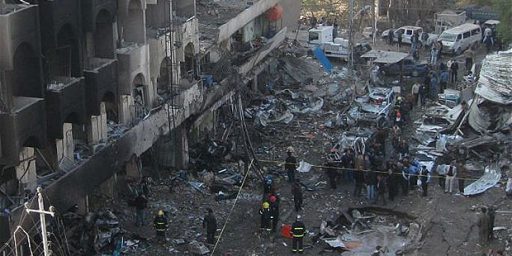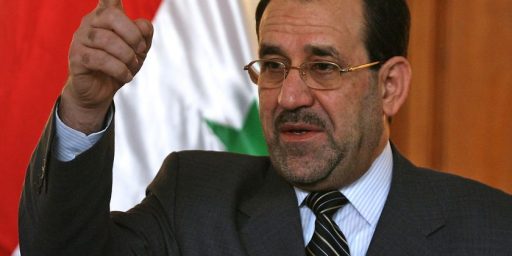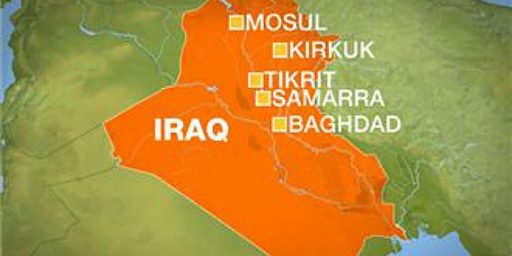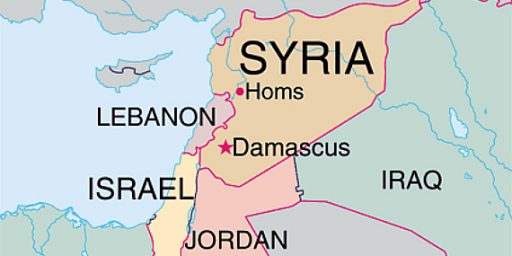Iraq On Verge of Sectarian Split?
It’s increasingly looking as if Iraq as we know it will collapse into multiple sectarian mini-states.
A large Sunni group has claimed the western tip of Iraq as a Sunni state.
An alliance of Sunni insurgent groups claimed yesterday to be establishing a separate Sunni state in the west of Iraq in the latest demonstration of the growing fragmentation of the country. The statement by the Mujahideen Shura Council, an umbrella organisation of fanatical Sunni groups that includes al-Qa’eda, is the first time a Sunni body has supported the break-up of Iraq.
It said the move was in response to the passing by the Iraqi parliament last week of a federalism law which would permit provinces to join together to form self-ruling regions. That is expected to result in the creation of a semi-autonomous Shia zone in the south, similar to the Kurdish state in the north. A separate Sunni state was needed to protect itself from such an eventuality, the insurgent group said.
So far, at least, Sunni politicians are resisting this move:
More moderate Sunni groups condemned the council. Mahmud al-Meshhedani, the speaker of the Iraqi parliament and a Sunni, called it “vulgar with no religion, who only kill others under the pretext of jihad”.
At a meeting in Kirkuk yesterday, 500 Sunni Arab tribal leaders and representatives said they were committed to maintaining the unity of Iraq. But their solution to the turmoil was no less controversial, as they demanded the immediate release of Saddam.
Still, the Sunnis are right to be fearful after the latest wave of violence which have sparked the beginnings of a refugee problem:
Families fled in search of safety Monday as open warfare raged for a fourth day between Shiite militias and armed Sunni men in Tigris River towns north of Baghdad. Militias allied with Iraq’s Shiite-led government held sway in Balad city, forcing out Sunni families and leaving the bodies of slain Sunni men to rot in the streets, according to police, residents and hospital officials.
The Iraqi government deployed still more reinforcements to try to calm the embattled towns and hold open the main roads, Interior Ministry spokesman Abdul Kareem al-Kinani said in the capital. But local police officers accused Shiite-dominated government police forces of working alongside Shiite militias in executing Sunnis and appealed for more help.
Not surprisingly, the failure of the Iraqi government to maintain order has escalated tensions with Washington:
American officials and Iraqis have expressed increasing frustration with inaction by Maliki, who this week indefinitely postponed measures both to disband militias and convene a reconciliation conference meant to close the widening rift between Iraq’s Shiite majority and Sunni minority.
Maliki has bridled at growing U.S. pressure to act against the illegal private armies, which include armed wings of the two biggest parties in his governing alliance of Shiite religious parties. The prime minister issued a statement late Monday stressing that government forces have already confronted militias in some provinces. His administration “is determined to confront the armed groups with all political and military means,” he said.
Meanwhile, there are calls for U.S. forces to do more:
A police officer in Duluiyah, Capt. Qaid al-Azawi, accused American forces of standing by in Balad while militiamen in police cars and police uniforms slaughtered Sunnis. Americans did act, however, in Duluiyah, arresting three local police officers whom they suspected of fighting with insurgents against the militias, Azawi said. Garver, the spokesman in Baghdad, said he had no information on these specific reports. “We’re providing assistance where we see criminal behavior, such as violence and killing,” he said.
These cries are mounting:
“People are bewildered because of the weak response by the Americans,” said one Balad resident who asked not to be identified for fear of reprisals. “They used to patrol the city every day, but when the violence started, we didn’t see any sign of them.”
Ironically, this coincides with calls for us to leave:
A mid-ranking Iraqi official of al-Qaeda in Iraq, Ma’an al-Ani, said scores of Iraqi members of Iraq’s most feared Sunni insurgent group had broken away, spurred by unhappiness at Sunday’s declaration. Creation of a separate Sunni state would only “tear the country apart . . . and divert from the main goal, which is getting Americans out,” Ani said.
A classic damned if you do, damned if you don’tsituation. But that’s counterinsurgency for you:
The situation in Balad, about 50 miles north of Baghdad, appears, in stark form, to show the dilemma for American military commanders at a time when they are hastening the transfer of wide areas of the country to Iraqi forces. They are also insisting that those troops take the lead in quelling violence, leaving American forces to step in only when asked.
It also highlighted yet again the powerlessness of the Iraqi forces to stand in the way of such sectarian violence.
Sectarian violence and retribution killings of the kind that unfolded in Balad over the weekend are the purview of the Interior Ministry, in charge of Iraq’s police forces, and the Iraqi government in general, said Lt. Col. Michael Donnelly, a spokesman for the military’s northern command in Iraq, adding that responsibility for the Balad area was transferred from American military units to the Fourth Iraqi Army about a month ago.
The job of the United States military in Balad, he said, is to work “by, through and with” its Iraqi counterparts “to build further capacity to reduce the violence, and bring about stability.”
American military commanders reviewing what happened over the weekend concluded that the situation in Balad was best dealt with by the Iraqi armed forces, a senior American military official said. The senior officer, who requested anonymity because he was not authorized to speak publicly on the subject, said that American commanders viewed the upheaval in Balad as a new test for the Shiite-dominated government of Prime Minister Nuri Kamal al-Maliki, who has come under American pressure to crack down on militias that have been responsible for much of the killing in the country.
The American military eventually provided what Lt. Col. Christopher Garver, a military spokesman, described as “quick reaction force assistance” to the Iraqi Army and the police in the area. “We were waiting for a request from the Iraqi government,” he said.
The same dilemma faces the Iraqi government. Andrew Sullivan summarizes it nicely: “The awful truth seems to be: Maliki cannot restrain the militias; the sectarian violence is getting worse, not better; and yet Maliki is resisting partition or a big new infusion of U.S. troops.”
The old adage about getting out of the middle of the road lest you be hit by cars going in both directions is particularly apt here. Maliki needs to decide, pronto, what level of support he wants from the United States and the Iraqis need to decide, quickly, whether Maliki is the right man for the job. It’s not clear at this point whether it’s too late to make a difference but sticking with the present course much longer is not a viable option.






You didn’t get the “Stay the course” memo from the White House?
Don’t worry, this partition thing isn’t going to happen. Via Billmon:
President George W. Bush said he would reject any recommendation to partition Iraq along ethnic and sectarian lines, and he reaffirmed his confidence in Prime Minister Nuri al-Maliki’s ability to unify the country.
And of course, making Bush the ruler of Iraq was the entire *point* of the invasion.
So let it be written — so let it be done!
Watch the Republicans distance themselves from Bush and Iraq and blame everything on the White House and the Pentagon – they will suddenly have a new message…just wait – and it will not include a democracy being the goal in Iraq.
Conversation between GWB and Saddam in 2007 – “Hey Saddam ol’ buddy…sorry about Uday and Quasay. You want your old job back?”
>Not surprisingly, the failure of the Iraqi government to maintain order has escalated tensions with Washington:
Right, blame the Iraqi’s for this friggin’ disaster. Can’t possibly be Bush’s fault…
Maliki, indeed, the entire Iraqi government are creatures of the militias. I doubt that they can or will do anything about them and without that the government can’t succeed.
I have no idea whether Iraq will actually partition. I suspect that if it does the Turks, Iranians, and Syrians will find reason to intervene in the northern, Kurdish region and the Iranians and, possibly, the Saudis will find reason to intervene in the southern, Shi’ite region.
The Sunni Arabs in the western region, left in a Bedouin territory without much in the way of resources, will have little motivation to stop anything they’re doing now in the way of war, crime, and general hooliganism.
In brief it won’t make a great deal of difference.
Which is why it’s so useful to have Dependency Theory in the mental toolbox before embarking on this kind of adventure.
“Hey Saddam ol’ buddy…sorry about Uday and Quasay. You want your old job back?â€
“Damn kids were never any good anyway. You’re so lucky you had girls, Dubya. Sure thing, ol’ buddy.”
(Hey, Frist is making peace with the Taliban … why not?)
More Saddam cheerleading – whodathunkit?